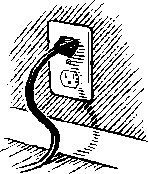We hear this word from time to time, so I thought we would examine it further. Apples, they're sustainable. Oranges too. Crops in general, barring some catastrophic event, are sustainable. It means we can perpetuate something, virtually forever.
However, with respect to energy,we are not currently in sustainable mode. The United States and the rest of the world have vast supplies of fossil fuels. They will last hundreds of years, maybe more. But they're not sustainable. We cannot perpetuate them beyond their finite limits, notwithstanding their abundance.
So, what is sustainable? Certainly, hydroelectric power is sustainable, assuming it continues to rain in some catchment basin forever. Wind power is sustainable, presuming the wind will blow forever. This too is a good assumption. Will the wind blow when you most need it is still up in the air. Solar power is certainly sustainable, at least for the five billion years of sunlight we have left. It presumes we have sufficient materials to continue to build solar collectors and photovoltaic cells. This is also a good assumption for the foreseeable future. But the sun shines on its own terms.
That's supply side sustainability. And at the moment with current technology the sustainability of these wonderful resources will not provide sufficient energy to displace fossil fuels long into the future . . . and maybe never. I'm not any happier than anyone else about that, but realism when it comes to sustainability is no vice. Paraphrased and stolen from, possibly, Cicero.
Unfortunately, we don't have enough demand side sustainability. Maybe I should say that the other way around. We have too much demand side sustainability. As a society, we constantly, almost mindlessly, sustain our demand for energy. Think of it in terms of two statistics: population growth and consumptive growth. Nothing is static.
There are seven billion people on planet earth. In one hundred years, who knows, that could increase by fifty percent. I didn't look up the estimates. Doesn't matter. All of those people will use energy. They're not going to sacrifice. In terms of growth in consumption, just look at yourself and others around you. Be honest. Desktop? Laptop? Blackberry? Cell phone? More than one? Digital camera? LCD or Plasma TV? Shall I go on?
Let's take something simple, like the digital camera. Are you willing to go back to using 35 millimeter film in a single lens reflex camera ? I date myself. The SLR didn't require a charge and only needed a battery for the flash. And a little flat battery for the light meter that lasted for years. Is such a thing even available any more, except on Ebay?
People are not willing to go backwards, no matter how many of us vocalize for sustainability. But there is an energy source that is sustainable and possibly forever, as best one can determine that period of time. I refer to the nuclear fast breeder reactor. This reactor actually creates more fuel than it uses. It can perpetuate the current known stock of uranium by 100 fold. And if we use the vast amounts of uranium that are in the sea, it is as close to sustainability as one can get with the population and consumption growth we experience.
Is this easy? No. Does it require resolve? Indeed. Is it a more plausible goal with the cooperation of the world's governments? Of course. Is there risk of proliferation? There is. But there are risks in everything we do. And when it comes to energy, it's all dirty in one form or another. No matter what technology we use, it creates something to clean up after. The question is do we run after tens of billions of annual tons of pollutants in the atmosphere? Or do we deal with a football field's worth of nuclear spent fuel and reprocessing risk over a long period of time? Let me know?




No comments:
Post a Comment